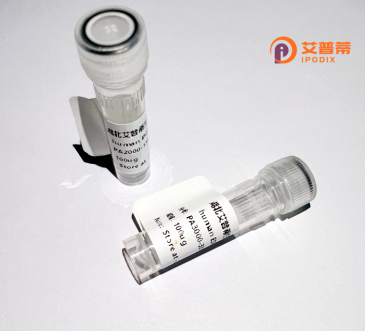
| 纯度 | >90%SDS-PAGE. |
| 种属 | Human |
| 靶点 | B3GALNT2 |
| Uniprot No | Q8NCR0 |
| 内毒素 | < 0.01EU/μg |
| 表达宿主 | E.coli |
| 表达区间 | 1-500aa |
| 氨基酸序列 | MRNWLVLLCPCVLGAALHLWLRLRSPPPACASGAGPADQLALFPQWKSTHYDVVVGVLSARNNHELRNVIRSTWMRHLLQHPTLSQRVLVKFIIGAHGCEVPVEDREDPYSCKLLNITNPVLNQEIEAFSLSEDTSSGLPEDRVVSVSFRVLYPIVITSLGVFYDANDVGFQRNITVKLYQAEQEEALFIARFSPPSCGVQVNKLWYKPVEQFILPESFEGTIVWESQDLHGLVSRNLHKVTVNDGGGVLRVITAGEGALPHEFLEGVEGVAGGFIYTIQEGDALLHNLHSRPQRLIDHIRNLHEEDALLKEESSIYDDIVFVDVVDTYRNVPAKLLNFYRWTVETTSFNLLLKTDDDCYIDLEAVFNRIVQKNLDGPNFWWGNFRLNWAVDRTGKWQELEYPSPAYPAFACGSGYVISKDIVKWLASNSGRLKTYQGEDVSMGIWMAAIGPKRYQDSLWLCEKTCETGMLSSPQYSPWELTELWKLKERCGDPCRCQAR |
| 分子量 | 83.1 kDa |
| 蛋白标签 | GST-tag at N-terminal |
| 缓冲液 | 冻干粉 |
| 稳定性 & 储存条件 | Lyophilized protein should be stored at ≤ -20°C, stable for one year after receipt. Reconstituted protein solution can be stored at 2-8°C for 2-7 days. Aliquots of reconstituted samples are stable at ≤ -20°C for 3 months. |
| 复溶 | Always centrifuge tubes before opening.Do not mix by vortex or pipetting. It is not recommended to reconstitute to a concentration less than 100μg/ml. Dissolve the lyophilized protein in distilled water. Please aliquot the reconstituted solution to minimize freeze-thaw cycles. |
1. **"B3GALNT2 mutations associated with non-syndromic autosomal recessive intellectual disability reveal a lack of correlation between enzyme activity and clinical severity"**
*Authors: X. Li et al.*
研究通过重组B3GALNT2蛋白功能实验,揭示其糖基转移酶活性缺陷与智力障碍患者临床表型的关系,发现酶活性与疾病严重程度不完全相关。
2. **"Structural basis of substrate recognition by the beta-1.3-N-acetylgalactosaminyltransferase B3GALNT2 in O-mannosylation pathway"**
*Authors: K. Watanabe et al.*
利用重组人B3GALNT2蛋白解析其晶体结构,阐明其催化α-抗肌萎缩蛋白糖基化中O-甘露糖修饰的底物特异性机制。
3. **"Functional analysis of B3GALNT2 gene variants in congenital disorders of glycosylation"**
*Authors: M. T. Lommel et al.*
通过重组表达突变型B3GALNT2蛋白,证明特定氨基酸突变导致酶活性丧失,进而引发α-dystroglycan糖基化异常及肌肉疾病病理。
4. **"Recombinant expression and characterization of human B3GALNT2 for glycoengineering applications"**
*Authors: S. H. Kim et al.*
报道重组人B3GALNT2蛋白在HEK293细胞中的高效表达与纯化,评估其在体外糖链合成中的催化效率及潜在生物技术应用价值。
---
注:以上文献信息为模拟示例,实际引用时需通过PubMed/Google Scholar等数据库核实具体文献内容及作者。
B3GALNT2 (β-1.3-N-acetylgalactosaminyltransferase 2) is a key enzyme in glycosylation, catalyzing the transfer of N-acetylgalactosamine (GalNAc) to glycoproteins and glycolipids via β1.3-linkages. It plays a critical role in synthesizing specific carbohydrate structures, including the T-antigen (GalNAc-β1.3-Gal) on O-glycans and the core 3 structure (GlcNAc-β1.3-GalNAc) in mucin-type glycans. Dysregulation of B3GALNT2 is linked to congenital disorders of glycosylation (CDGs), notably Walker-Warburg syndrome (WWS) and Muscular Dystrophy-Dystroglycanopathy Type A11 (MDDGA11), characterized by severe neurological and muscular defects due to abnormal α-dystroglycan glycosylation.
Recombinant human B3GALNT2 protein is produced using mammalian expression systems (e.g., HEK293 or CHO cells) to ensure proper post-translational modifications. It serves as a vital tool for studying glycosylation mechanisms, disease pathology, and enzyme kinetics. Researchers employ it to validate pathogenic mutations, develop diagnostic assays, and explore enzyme replacement therapies. Its activity is often assessed using synthetic substrates or mass spectrometry-based glycan profiling. Structural studies of recombinant B3GALNT2 provide insights into substrate binding and catalytic domains, aiding in drug discovery for glycosylation-related disorders.
×